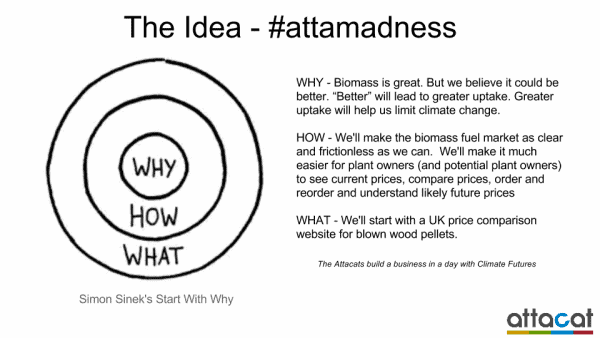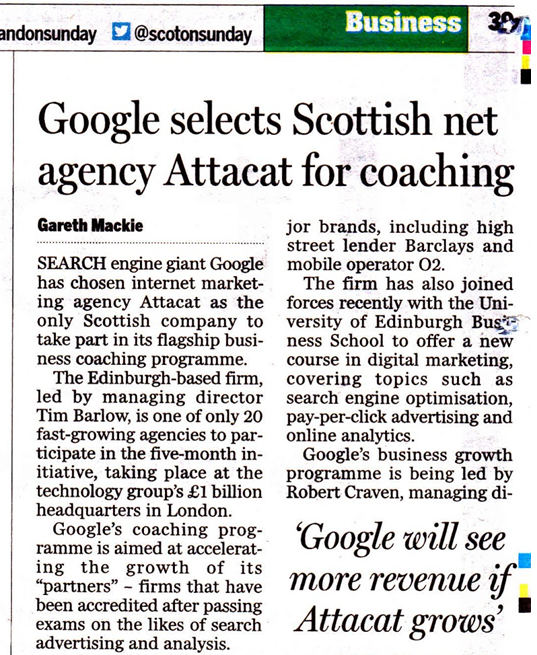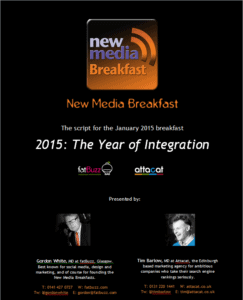It’s been just over a month since we used Leap Day (29th February) for our #attamadness “build a business in a day” challenge. It’s obviously been exciting but it’s also been an incredible learning experience.
The TL:DR version of this article is that we’ve quickly and inexpensively learned that the business model is going to need a little bit of a tweak and we are therefore on the road to achieving great things!
Where’s The Woodpicker now?
Since the #attamadness launch day, TheWoodpicker.com has been in the capable hands of Juliet with direction from Charlie. Thanks to messing my knee up on day one of my skiing holiday, I’ve also been able to put the odd hour in here and there too. The social side of things is also beginning to grow, with the launch of a Facebook and Twitter discussion, which we hope to make a monthly thing to bring together suppliers and customers to discuss the issues and questions they may have.
Here’s an interview we did for The Scotsman TV one week after the launch
https://www.youtube.com/watch?list=PLl-Rj1kcCvWQ51r1jxsDjQxzhnlMAEBfH&v=0s7R2N4QAjw
Since then we’ve:
- passed the 100 customer* mark (who we estimate represents around £300,000 worth of annual pellet consumption)
- Built a grandly named “quote management system” – basically a reasonably sophisticated Google spreadsheet (with my personal highlight being the script that I managed to cut and paste to automatically calculate distance between two postcodes)
- Almost got a bank account set-up (yet we’ve still been able to take payments using GoCardless for direct debit)
- Sent our first newsletter
- Most importantly we’ve:
- learned what customers and suppliers don’t want
- continued to talk to a lot of customers and suppliers
What about the money?
We have processed some but it’s fair to say we’ve got a long way to go before we can include the word “profit” in our management accounts! Just because we’ve described people who have used our service as customers, doesn’t mean there isn’t a lot to do before we will be able to describe these people as repeat, loyal customers.
The most important bit of the accounts, though, is that we’ve also spent very little, meaning we still have money in the bank (or “runway” as a start-up would describe it).
Main lessons learned
The disciplines being forced on us as a result of the “business in a day” format has been an incredible learning experience. We jumped in at the deep end and now have no choice but to swim. That means procrastinating or doing it all myself (often my default position!) are just not options. That is incredibly liberating!
The approach has also made the ideas behind “agile” and “lean start-up” very real for me and that is a lesson that will be invaluable for developing Attacat as well as for working with clients to help them achieve their goals.
I suspect that when people first hear the start-up mantra of “fail quickly”, they think of major disaster followed by consoling yourself that at least you won’t make that mistake again.
However, that could not be further from the truth. The first month of The Woodpicker has shown me that the mantra is far more about learning rapidly that some things do not pan out exactly as you might expect. If I was to describe that as “failure” it would be very misleading as actually we have made a huge leap forward.
 The iteration of The Woodpicker we launched on February 29th was entirely based on what we thought customers and suppliers would want. Turns out, it’s not that simple. A few do want what we’re offering and a good number don’t (at least not in its current form). We haven’t yet achieved the level of customer delight that I thought we would.
The iteration of The Woodpicker we launched on February 29th was entirely based on what we thought customers and suppliers would want. Turns out, it’s not that simple. A few do want what we’re offering and a good number don’t (at least not in its current form). We haven’t yet achieved the level of customer delight that I thought we would.
I view this as a real positive though. If we’d done it the traditional way, we would still be debating the wording on the website and building a back-end system to automate the business process and probably still be three months away from getting any real customers to use the system. We would have spent more and learned nothing.
Instead, we built the simplest system we could that allowed customers to interact with us and one month in we’ve learned a huge amount from those customers. Our “price comparison search engine for wood pellet fuel” may only have been a website form. It really hasn’t mattered that our “back-end” was not a nice efficient bit of software (instead it was Juliet literally ringing round the suppliers to get prices and then emailing the information to the customers!). What matters is it has been sufficient to learn a huge amount from real customers.
In lean startup terms we’ve run our first experiment, and are now ready for our next one. And here are the real positives of this approach:
- We’ve got lots of ideas we wouldn’t have had otherwise.
- We’ve demonstrated that there is a real demand for “something” in this space and have started to build up a database of those who are looking for this “something”.
- We’ve saved ourselves a fortune already (as in, we haven’t wasted money developing the wrong product, which now means we still have money to spend)
Going forward, our next “experiment” will also take a “lean” approach. At this point, we think we know what customers will want. We now need to work out what the “minimum viable product” is to determine if this second hypothesis is right, or, most likely, whether it too will need some tweaking.
If we go back to the original “start with why” we set out a month ago, that vision is as strong as ever.
It may be that the “what” is going to be slightly tweaked as a result of what we’ve learned this month, but the “why” and “how” are totally unchanged and indeed our confidence that we are on the right track has been bolstered by getting into the market place quicker than perhaps we even thought was practical.
If you would like to discuss how these “lean” approaches could help you achieve your digital goals, please do get in touch or feel free to share your own experiences in the comments below.
A leap day challenge to build a climate change focused, mission-based, business.
Summary of progress
- Concept for the new business announced at 9am (a UK price comparison website for blown wood pellets)
- First website went live within two hours
- Brand name brainstormed in 1.5 hours (The Woodpicker), logo 1.5 hours later!
- First customers acquired through Google AdWords by the end of the day
- 2nd website released with basic quote request functionality at 8pm
- 8pm – Mission accomplished. Trading business created in 11 hours. Now the new team will take it on and develop the business model
- We’ll publish a round up and update you on the new business progress when we’ve recovered!
Background to the challenge | Watch live broadcasts | Office Spycam | Hashtag live stream
[cta_button text=”Subscribe to email updates” padding=”12px 20px” font_size=”18px” target=”#email-sign-up”]
Live Reporting
Brought to you by our very own Social Squad!
How (you could have watched) live broadcasts
There will be several live broadcasts throughout the day (technology willing!). These broadcasts will go out simultaneously on:
- this page in the live reporting section
- Attacats facebook page
- @attacats twitter
- Tim’s LinkedIn
- Periscope
The best way to watch live broadcasts
However for the best experience, we recommend using Periscope. For the uninitiated, here’s how to do it:
- Follow @attacats twitter account on twitter (you’ll need a twitter account)
- On your smartphone install the Periscope app (Android or iPhone)
- Open up the Periscope app and when asked enable notifications
The advantage of this method is that you’ll get a notified on your smartphone as soon as we go live thus ensuring you don’t miss a thing! With the other methods, you’ll have to be in the right place at the right time.
Missed a live broadcast? They’ll all be in the live reporting feed.
Live Webcam
Many kept half an eye on activity in the Attacat office throughout the day.
Update: Follow all the #attamadness action live here
Hooray! We’ve been given an extra day this year! The 29th of February is just a week away and the Attacats are going to use this leap day to do something a bit different:
We are going to set-up a completely new business. From scratch. In a single day.
At 9am on Monday (29th) the business, which has nothing to do with digital marketing, will be nothing more than a concept. At that point it won’t have a name, will have no market research, no customers, no suppliers, no employees and certainly no website or marketing plan.
The aim is to create or define it all in a day using the Attacat team (and possibly a little help from you via social media as the day progresses)!
The “big reveal” at 9.00am on the 29th
Here’s the real kicker: the team know we are using the day to set up a business but I’m keeping the idea itself close to my chest until the day. Before then they’re getting nothing more than the odd clue that might slip out on Facebook.
So while the day should be great fun, educational and rewarding, this isn’t just a team building exercise; it’s a business idea I genuinely want to make a go of.
*We’ve still got a good bit of work to get done before the end of the month, so it’s not just about being mysterious; the Attacat day-to-day must continue without distraction!
One day only
The principal aim is to get the business up and running in a day, and by ‘up and running’ I mean a state where it can run on an ongoing basis with minimal input from me.
That last part is really important. I (and the team) are, of course, committed to Attacat so if we can get someone in to run this new business and work to automate it as much as possible then we can do it for a day and then get back to the day job!
Is it mission impossible? It’s a big ask, yes, but then again it’s not every day that 12 Attacats set out to solve a problem together. As with any leap into the unknown we’ll find out on the day.
Where has all this madness come from?
We all put off doing things for lack of time. What would you do if you were told you’d been given an extra day next Monday and everything else could wait?
I’ve always wanted to try to build a business in a day (long before the Apprentice started!). A week ago I was thinking about my latest business idea when an email from Gordon White at fatBuzz came in talking about how they were using the ‘extra day’ of the 29th*. That was it. I suddenly realised this was my golden opportunity to give it a go. My brain has been in overdrive since!
I hope you’ll join in the fun (or, at least, witness the mayhem) on the day through social media (#attamadness). Stay tuned to the Attacat Brain this week for more information and sign up to our newsletter (scroll down) for a reminder to tune in on the day.
*You should check out how fatbuzz are using their extra day, it’s pretty cool.
Note for Attacat clients
If you’ve got anything you think we might need to do for you on the 29th (next Monday) then it would be hugely appreciated if you could give us as much warning as possible please so we can plan it in. Obviously if we can do it this week instead that would be even better!
Follow the day live!
We’re going to be live reporting #attamadness throughout the day! Why not stay tuned?
[cta_button text=”Tune in for #attamadness live” target=”/brain/attamadness-live”]
Want to know what the best “content marketing” I’ve experienced this year is? Clue: It’s not what you might usually consider as content marketing.
I’ve recently been on the receiving end of a truly remarkable piece of content marketing. It’s a piece of B2B marketing that has cemented a long-standing love affair that I have with a company. It’s something that has already delivered ridiculous value for me and will continue to do so over many years.
So this post is a means of publicly saying thank you, but also hopefully serves as a nice case study of what great marketing can look like.
So what’s the content?
It’s the Google business coaching program that I’ve just completed. Essentially it was free business school for digital agencies. We were lucky enough to be selected as the only Scottish agency and one of only 20 across the UK (see coverage in The Scotsman below).
I’ve spent four days at Google London over the last four months being trained by a (non-Googler) specialist who knows agency land like the back of his hand. In between each session, I had 1-on-1 coaching with the trainer. All this was done without any mention of Google advertising products whatsoever. I’ve also gained a new peer group of other agency founders and managers who all seem to be grappling with (or have already grappled with) the same challenges and opportunities that I have to deal with.
And it’s been bloody brilliant (if you’ll excuse my french). And I’m ready to take on the world!
But that’s not content marketing?
Well why not?
- It’s been about the delivery of content;
- just because I’m an existing customer, doesn’t mean that I don’t need marketing to.
- The fact that there’s been no mention of the end product also doesn’t exclude it from being classified as “marketing” in my mind.
But it’s not digital!
Not in a strict sense, no, but that doesn’t matter. As Gordon White and I discussed at the January New Media Breakfast (you can still download the script to that here), it’s not about digital marketing but marketing in a digital world.
The business coaching program is a perfect example of this.
Yes, I could talk about how there’s an online discussion group as part of the course and there’s no doubt online collaboration was required to bring together the course materials. Furthermore, they could now create an online version of the training (which they no doubt will) and they did use customer data to single out the 20 agencies etc. However that would be missing the point. Entirely.
The true “digital” part of this is Google (not surprisingly!) recognising that the internet has changed the effectiveness of most forms of marketing for better or worse. The internet forces us to change where we invest our marketing effort, regardless of whether that effort is put in offline or online. This example is right out of the “adding value” marketing playbook:
“Ask not what your marketing can do for you, but what it can do for your customers“ i.e. the mindset of the digital marketer: working out what keeps your customer awake at night and then solving the problem for him or her.
In Seth Godin terms, Google have earned my permission for them to talk to me (anytime!). They’ve built a relationship (without mentioning their products) which means that when they do reach out to discuss their products, I’ll listen. That’s a very “digital marketing” mindset.
Targeting influencers
Another aspect to it is zeroing in on “influencers”, given the importance of third party recommendations to marketing today. It just so happens that I’m actually an “influencer” of Google’s ultimate customers (business owners and marketers – our clients, future clients and others whom will never work with us but may hear me or one of the team talk at an event or read posts on our blog and so on).
That’s where they’ll get the ROI from. I simply couldn’t have had the same influence pre-Internet and the now-somewhat-neutered traditional advertising would probably have been the quicker route back then.
So a huge thank you to Google for having the foresight to come up with this amazing program and for the investment you’ve made in Attacat and I. Please be assured that the ROI will be phenomenal!
At the request of those who came along, here is my slide deck from last month’s New Media Breakfast presentation.
I tended to speak around the slides so this will primarily be of use to the attendees. For those that didn’t make it, I’ll aim to blog about some of the content over the next month or two and there may also be a forthcoming podcast on the subject so stay tuned.
I’m currently being put through, what is in effect, “business school” by Google (who selected us as one of 20 agencies from the 30,000 on their list – more about that another time) and this article that was shared to the group caught my attention:
From Mad Men to Sad Men: Is the client/agency relationship in crisis? from Campaign.
In particular though it was these two quotes:
Agencies are largely behind pace. It’s now all about putting customers first and designing seamless experiences – driven by tech and innovation.
and
The marketing role has clearly diversified and communications now make up only a small part of the marketing mix. Instead, managing the customer experience is taking up an increasing proportion of marketers’ time and budget.
It rang true because it expresses so much of what I’ve been trying to communicate over the last several years, perhaps more importantly because when I look at the best work we are doing for clients, it fits into this category.
It is also the work that excites our clients who are most engaged with us. Take for example this recent comment from a customer who brought us in to develop their marketing plan:
Thanks for your time today – it was invaluable and we now have a direction for the group – at long last!!
We are [details of how they plan to move forward with the proposed new customer experience that will form the key tenant of the organisation]. Thanks again to you all for your help. I for one, am feeling excited about the future of ‘[new experience]’.
It wasn’t really a marketing plan we gave them (though we did as part of the work to ensure we met the original brief) but a plan for a “seamless experience” that put the customer first. The base that could then be marketed. Without it, the marketing would simply have fallen on deaf ears.
It may not be what clients are coming to us for (yet!) but it is this work that marks the turning point in our client relationships, where we move from being seen as an SEO and PPC provider to more of a partner intricately involved with many aspects of the client’s business. We call it “online business optimisation”.
To return to the article:
For agencies in the customer experience space, this is an exciting moment in time. Customer experience skills are in demand in the boardroom and an understanding of how to solve business problems through technology is at a premium. Most of these agencies are receiving briefs that include the words “business” and “transformation”.
Although we are doing increasing amounts of this sort of work, we aren’t yet receiving those briefs but if I’m honest, the thought of receiving them excites me.

I believe that the Attacat skill set is well disposed to this. We get tech, we provide innovative solutions, we create seamless experiences that put the customer first and we regularly discuss and at least tweak (if not transform) business models.
“Custom” gives us a competitive edge. It’s essential for getting ahead, yet it often ends up holding us back.
Over the years of working with web businesses (including a few of my own), I’ve seen businesses that have become almost crippled by historical decisions to go “custom”.
Here are a few example scenarios where “custom” can really cost.
The beautiful design vs the dull flexible one
We are often told that a picture is worth a thousand words, but I don’t remember ever being warned that pictures also cost more than a thousand words.
The process of getting words onto a website is generally much easier than getting custom graphics or even photographs onto a website.
This morning I decided to write this post (the idea was triggered by a mild panic about the amount of effort we are investing in making our forthcoming website beautiful). 3 hours later. Job done.
Had I decided I wanted a custom graphic I’d have had to brief our designer and fit it into their schedule (she’s booked out for the next three weeks). There’d likely be several iterations and my thoughts would evolve over that time so I’d ask for further changes. It wouldn’t surprise me if something more important came up and the post would never have been completed.
Of course, if I was a graphic designer then I could get the graphic out in the same time it took me to write the post. However unlike my post, I’d probably be the only one able to change and evolve it. That’s not a massive deal with a blog post, but it really is when it comes to the main pages of your website as they need to evolve over time.
Beautifying a website is not just about graphic files. It involves code, it needs to fit with the marketing flow of the site and accurately reflect the business. Perhaps it also involves compliance and SEO input. You can quickly see how five or more people will need to get involved (designer, coder, business leader, SEO consultant, UX designer, compliance officer etc etc) and every time you want to make a change you need to reconvene most of that team.
If that change was just a case of changing text though, the change can often be done on the spur of the moment by one person at a fraction of the cost, and most importantly at a cost that doesn’t require a tedious sign-off process. So no department head or finance team to add another two or three people to our list of six or so!
So it’s not just the cost of the initial customisation, it’s the cost of change and the resultant lost opportunity of not making that said change.
Amazon and eBay are the leading protagonists of the “simple design” approach and its no accident that they also lead the field in continuous improvement through testing: they achieve competitive advantage through constant evolution rather than perceived face-value beauty.
The cost per iteration with “beautiful” is much much higher. Testing, therefore, will not get into the DNA of the business. Indeed, the reality that a design might fail is simply swept under the carpet.
Over the years, I have moved from believing that “ugly sells” to a much greater appreciation of the value of design. Which is why I’m currently pre-occupied with making our forthcoming website beautiful. Beauty is a good thing, but it needs care. My motive for writing this post is to remind myself to keep that beauty as simple, flexible and repeatable as practical.
The SEO fix vs accepting the flaws
One area we have a lot of experience in is resolving technical SEO issues. I remember specifying a set of changes for one website that was being built on an up and coming e-commerce platform.
We specified fixes, the fixes were made, but the fixes didn’t play nicely with the system which illustrates another risk of bespoke: the unforeseen immediate complications. Then every time there was a major development upgrade there were further problems: the unforeseen future complications.
It reached a point where we decided that living with the SEO flaws outweighed the benefits of the custom fix. An important lesson learned. We are now much more careful about working within limitations of systems unless we can influence the direction of the system itself or at least the developer’s standard install (rather than just the clients install of a system). This is an atempt to make the cost of the maintenance of the improvement less likely to be on the shoulders of one client.
The cloud-based industry solution vs the bespoke business system
Functionality customisations come large and small. Even small ones have costs as illustrated by the above SEO example, but most businesses will at some point face the decision of custom versus bespoke for major business systems. In some cases, that system might actually be the business and this is where there is a real temptation to go down the bespoke route.
Let’s say you are a wine merchant. You realise that the traditional model of selling wine in your local community is majorly threatened. You decide you need to change your business to adapt to this. Selling on the internet is likely to be part of that solution. You search the net and find a system designed specifically for wine merchants. You review it and find it falls short on one feature you deem key. So you decide to go down a bespoke route.
I’ve seen more than one business fail because of such a decision. Meanwhile the wine merchant* that learned to live with the off the shelf solution has the time to focus on customer service, sourcing better wine and marketing. The lack of flexibility in the system actually gave them more flexibility in their business.
*although not wine merchants, this is something I’ve seen with four competitors in one industry. Two took the off the shelf cloud based system. Two went down the bespoke route. The first two are growing, the other two are stagnating.
The lesson?
When making decisions about customisation, don’t just consider the cost of the customisation, factor in the compounding costs of maintenance and impact on change as well. If you are going down the bespoke route accept that you are being ambitious and that the rest of the business plan needs to match that ambition.
What experiences have you had with customisation? I suspect that this is a principal that is equally applicable to business in general rather than just websites?
Back in January Gordon White (from fatBuzz) and I presented a New Media Breakfast on the topic of “2015: The Year of Integration”. Our presentation made the case for removing the distinction between off and online marketing and focusing on joining up your data; content, relationships, search, social, advertising, seminars, networking, poor golf skills and so on.
This Month Only: The Script in Full
For this month only, we are making the full script available to read at your leisure. The full slide deck is also available.
The script includes:
- several ways to make your “offline” activities more “digital”
- case studies
- all the bits we meant to cover but didn’t
- a hot-off-the-press Attacat overview process for joining up all your marketing
Sadly it doesn’t include:
- all the bits we didn’t mean to cover but did!
- the wit, the insightful questions and the new relationships that the attendees bring to the occasion
- the bacon roll, fatBuzz notepad and Attacat mug give-aways
(For those, there’s no option but to attend. See you next month?)
To get the script and the slides just sign up below and we’ll send you the link.
(We will also take the liberty of subscribing you to the fatBuzz and Attacat mailing lists – you can unsubscribe at any time)
Warning: The script does contain thaipos and mispellings. The script is very much complete but never the less, slightly rough around the edges.
We also very much hope you’ll come along in person in February (in either Edinburgh or Glasgow) where we are talking “Utility Marketing” (nothing to do with electricity and water, it’s about making your marketing useful for your customers). Details here.
Yesterday Edinburgh University launched a new “Centre for Robotics” as part of its flagship Informatics school.
I was tempted along to the inaugural lecture simply because of my love of all things tech. However I also have a gut instinct that robotics will play a role in marketing at some point in the future.
My flawed theory went: anything that can be created automatically can potentially be supplied for free – when something can be supplied for free it becomes part of a marketer’s arsenal – it allows us to offer great experiences to prospective customers. Would robotics become an arm of the already overly stretched verbiage of content marketing? It turned out that this is unlikely, but I did learn that the tech that will allow automated personalisation of marketing is about to develop in interesting directions. 
In terms of my content marketing hypothesis, of course I forgot the one key element of “free”. The components need to be free too. Designs can be supplied for free and then a prospective customer can use a 3D printer to make them useful. That’s why giving away designs is something that marketers are thinking about. Giving away all the “ink” required for 3D printing though is of course cost prohibitive (unless of course you can sustain a huge cost of customer acquisition). We therefore aren’t suddenly going to be able to use robots to create lots of freebies.
So the hypothesis may have been quickly destroyed but I did have a very interesting chat over breakfast with someone from the department who did steer me in the right direction of what robots might do for marketing. Here are a few things I learned.
The cost of robotics is dropping dramatically
Robotics is becoming affordable for small manufacturing companies. That means that the so called long tail of things is becoming more of a reality. It’s increasingly viable to create products for smaller markets. That’s very interesting for reaching new markets.
We are a long way from mass ownership
The pace of cost reductions of robotics is somewhere between computing and car manufacture. There’s a lot of hardware in robots. It doesn’t seem like we will suddenly all have a smart robot in the same way we all have a smartphone, at least not for a long time. This obviously restricts marketing opportunities.
Functionality is limited
Robots that interact with humans are still at a very early stage. Daimler is using them to do some previously manual production line work inside the car. This physically onerous work is now done by a robot in co-operation with an operator outside the car. Clearly that’s a fairly limited set of interactions that is a gulf away from the nirvana of one to one marketing.
Robots’ ability to learn new tasks is also improving but remains limited. The idea of rapidly deploying robots on new tasks by “training” them is becoming a reality. However, providing the sort of human-like interactions that would allow marketers to create experiences certainly doesn’t sound like it is going to become part of my job description any day soon.
There is great news though for manufacturing in the developed world. The cost differentiation between here and China is likely to drop as robotics have increasing roles in production lines.
What robots are also likely to do in the shorter term is play a role in individual product customisation. Expect to see more of make-your-own-Nike trainers type initiatives. Marketers are going to have to increase their ability to learn from customers to service that.
Autonomous Systems that See
The main event turned out to be more about Artificial Intelligence (AI) than what I’d see as robotics. AI is obviously key for robotics to become useful (it’s the sensing part). It was in this lecture that I found much more relevance for the marketer. “Autonomous Systems that See” by Prof Andrew Blake of Cambridge University succeeded in exciting me about just how advanced technology is becoming (and scared me with how it is controlled by so few).
Speech
Speech analysis (as typified by Siri, Cortana, and Google Now) is becoming a day to day part of life. Even if the dialogues feel pedestrian, the understanding is quite remarkable. Professor Blake highlighted an example of a robotic receptionist, demonstrating it’s ability to understand real people at a real reception desk in a real environment (i.e. not just one person). This highlighted the next stage in customer support. Clearly we are going to see much more autonomous phone support. That might sound like your idea of hell, but we can’t deny that it has the potential to make customer service highly scalable and ultimately affordable for any business which may now be limited in its potential due to the need for expensive mass but complex customer service.
Automatic translation will also bring new directions. Watch Microsoft’s demonstration of translating in a multi-lingual Skype conversation:
Vision
Cars are now coming with computer vision as standard. Automatic braking in the event of people jumping in front of cars is already being shipped. Mercedes are now prototyping systems predicting what pedestrians will do. Others are now using computer vision to provide lower tech autonomous cars (cheaper ones than Google I assume). SEOs will obviously recognise the increasing ability to understand images and the futility of of overly worrying about headers as text for SEO purposes. Input devices such as Microsoft’s Kinect (that’s the device that brings embarrassing Dad dancing into the living rooms of many homes) have increased the potential to understand much more than simple keyword or keyboard input.
Marketing and Autonomous Systems
The key marketing takeaway for me from this morning is the pace of technology in understanding our customers and prospects. It’s improving dramatically. Autonomous systems are about to mean that personalisation is going to become much much more sophisticated. Right now we can alter our websites to tailor offers to a known “individual” based on past behaviour or known location but even that is more than the majority are doing. Technology is going to allow us to get much more granular with that though. It will make a “special offer for our loyal Edinburgh customers” message look like child’s play. It will make untargeted messaging just plain rude.
Summing up
So I learned a little about marketing but probably I learned more about what businesses need to be thinking about in general to be able to provide marketable products and services. I also hope that I’ve just witnessed the birth of what will become a world leading centre in a key area of technology here in Edinburgh. Certainly that is the stated aim. They’ve done it with machine learning/artificial intelligence so I have every faith the vision will be fulfilled. It’s exciting to have such capabilities on our doorstep.










